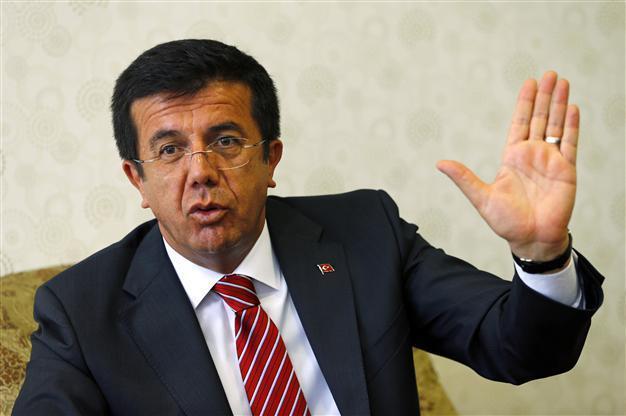Turkish government figures ramp up criticism of rating agencies
ISTANBUL

Economy Minister Nihat Zeybekci has claimed that Moody’s statement ignores 'Turkey’s democracy, national will and gains of recent years.' REUTERS Photo
Prominent economy figures from the Turkish government are stepping up their attacks on international ratings agencies in response to their warnings over political uncertainty risks.
The three top agencies – Moody’s, Fitch and Standard & Poor’s (S&P) – have become the target of senior members of the ruling Justice and Development Party (AKP), who constantly accuse agencies of “overlooking Turkey economic success” and acting on the interests of “certain interest groups.”
Economy Minister Nihat Zeybekci, who is known as a strong supporter of Prime Minister Recep Tayyip Erdoğan’s economic rhetoric, has been leading the criticism, particularly over the past few weeks.
Most recently, the minister lashed out at Moody’s after the agency released a statement that predicted that political uncertainties “emerging from the potential power struggles within ruling party” would persist until parliamentary elections in 2015.
“Moody’s carried out the order it had received from some people,” Zeybekci told state-run Anadolu Agency on Aug. 18.
“It didn’t talk about any of the Turkish economy’s positive performances and reversed all universal democracy and ethical standards to make assessments in compliance with the political scheme that some people asked for, instead of making economic evaluations that were expected from it,” the minister said.
Zeybekci also claimed Moody’s statement ignores “Turkey’s democracy, national will and gains of past years.”
S&P politically blackmailing Turkey: Bulut Another senior figure, Erdoğan’s chief economic adviser, Yiğit Bulut, has also been a vocal critic of the rating agencies.
Last weekend, Bulut accused agencies of conducting “political blackmail” against Turkey, after criticizing S&P for disclosing that it had revised its estimate of Turkish growth upwards in an interview, rather than releasing a report.
S&P director and senior economist Tatiana Lysenko revealed that the forecast for Turkey’s growth had been upgraded from 2.4 to 2.9 percent for the remainder of the year and to 3 percent for 2015 during an interview with the state-run Anadolu Agency last week.
Critics of the agencies and supporters of the government slammed the institution for not announcing the move with a separate statement.
Bulut also took to social media on Aug. 16 to blast the institution.
“S&P revised Turkey’s 2014 growth forecasts from 2.4 to 2.9 percent but didn’t announce it in its report … The truth came out later! SCANDAL!” he wrote on his Twitter page.
The consultant also slammed Fitch and Moody’s reports that warned over the risks “likely to emerge from consolidation of political in one man’s – Erdoğan’s – hands.”
“A credit rating agency can’t say ‘we will do this or it will be like this if a leader will expand his authority,’” Bulut wrote. “This is no longer an economic financial analysis, it is officially political blackmail … A credit rating agency can’t dictate a political thesis or a working style.”
Bulut shot to international prominence in 2013 during the Gezi protests by informing the country of a sinister international plot to kill Erdoğan “by telekinesis.”
